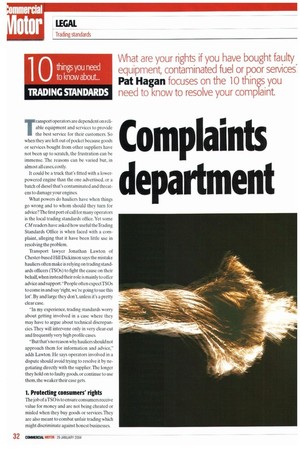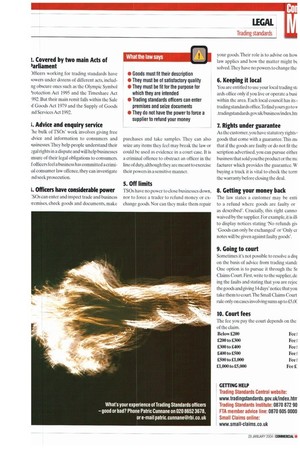Complaints department
Page 32

Page 33

If you've noticed an error in this article please click here to report it so we can fix it.
What are your rights if you have bought faulty equipment, contaminated fuel or poor services Pat Hagan focuses on the 10 thins you need to know to resolve your comp aint.
Transport operators are dependent on reliable equipment and services to provide the best service for their customers. So when they are left out of pocket because goods or services bought from other suppliers have not been up to scratch, the frustration can be immense. The reasons can be varied but, in almost all cases, costly.
It could be a truck that's fitted with a lowerpowered engine than the one advertised, or a batch of diesel that's contaminated and threatens to damage your engines.
What powers do hauliers have when things go wrong and to whom should they turn for advice? The first port of call for many operators is the local trading standards office. Yet some CM readers have asked how useful theTrading Standards Office is when faced with a complaint, alleging that it have been little use in resolving the problem.
Transport lawyer Jonathan Lawton of Chester-based Hill Dickinson says the mistake hauliers often make is relying on trading standards officers (TS0s) to fight the cause on their behalf, when instead their role is mainly to offer advice and support."People often expect TSOs to come in and say 'right, we're going to sue this lot'. By and large they don't, unless it's a pretty clear case.
"In my experience, trading standards worry about getting involved in a case where they may have to argue about technical discrepancies. They will intervene only in very clear-cut and frequently very high profile cases.
But that's no reason why hauliers should not approach them for information and advice," adds Lawton. He says operators involved in a dispute should avoid trying to resolve it by negotiating directly with the supplier. The longer they hold on to faulty goods, or continue to use them, the weaker their case gets.
1. Protecting consumers rights
The job of a TS0 is to ensure consumers receive value for money and are not being cheated or misled when they buy goods or services. They are also meant to combat unfair trading which might discriminate against honest businesses.
t. Covered by two main Acts of 'ornament )fticers working for trading standards have rowers under dozens of different acts, includrig obscure ones such as the Olympic Symbol protection Act 1995 and the Timeshare Act 992. But their main remit falls within the Sale if Goods Act 1979 and the Supply of Goods ,nd Services Act 1992.
Advice and enquiry service he bulk of ISOs work involves giving free idvice and information to consumers and pusinesses. They help people understand their gal rights in a dispute and will help businesses msure of their legal obligations to consumers. f officers feel a business has committed a crimiLai consumer law offence, they can investigate Ind seek prosecution.
I. Officers have considerable power TSOs can enter and inspect trade and business Premises, check goods and documents, make purchases and take samples. They can also seize any items they feel may break the law or could be used as evidence in a court case. It is a criminal offence to obstruct an officer in the line of duty, although they are meant to exercise their powers in a sensitive manner.
5. Off limits USOs have no power to close businesses down, nor to force a trader to refund money or exchange goods. Nor can they make them repair your goods. Their role is to advise on how law applies and how the matter might Ix solved-II-ley have no powers to change the 6. Keeping it local You are entitled to use your local trading sti ards office only if you live or operate a busi within the area. Each local council has its trading standards office.To find yours go to v .tradingstandards.gov.uldbusiness/index.htt 7. Rights under guarantee As the customer, you have statutory rights goods that come with a guarantee. This mi that if the goods are faulty or do not fit the scription advertised, you can pursue either business that sold you the product or the mr. facturer which provides the guarantee. W buying a truck it is vital to check the term the warranty before closing the deal.
8. Getting your money back The law states a customer may be enti to a refund where goods are faulty or as described'. Crucially, this right canna waived by the supplier. For example,it is ill, to display notices stating 'No refunds giv 'Goods can only be exchanged' or Only cr notes will be given against faulty goods'.
9. Going to court Sometimes its not possible to resolve a disj on the basis of advice from trading stanch One option is to pursue it through the Si Claims Court. First, write to the supplier, de ing the faults and stating that you are rejec the goods and giving 14 days' notice that you take them to court.The Small Claims Court rule only on cases involving sums up to £5,0( 10. Court fees The fee you pay the court depends on the of the claim.
























































































































































































